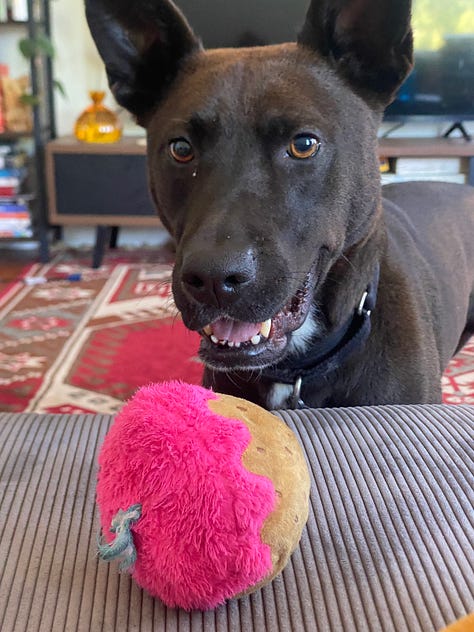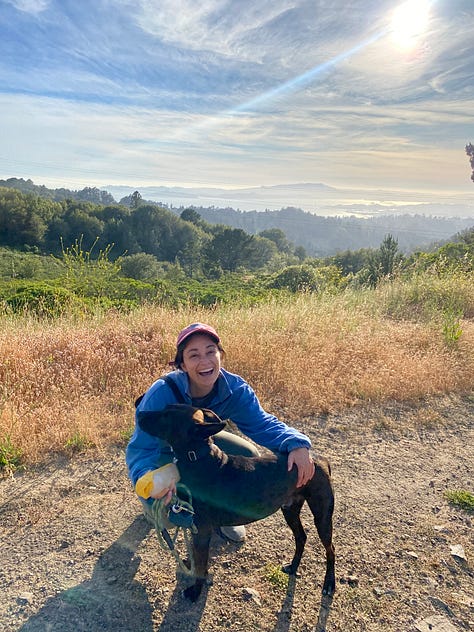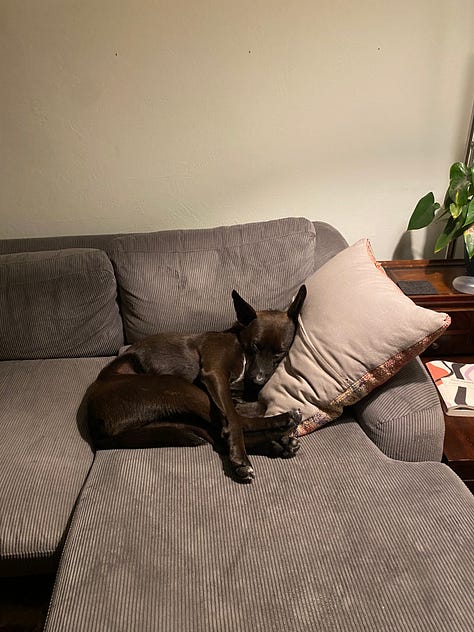I’m sitting outside in the ideal mid-morning glow. The clouds are everywhere today, all over the sky—sunglasses and awnings need not apply. There is no singular Big Cloud providing shade, beckoning me to call out “Thanks, Big Cloud! The comfort of this moment and this breeze in the soft light, this wouldn’t be here without you!” No, instead there are thousands and thousands of tiny cotton balls perfectly spaced so that the wind can blow in any direction and the conditions will remain. Each is unique, though all are a similar size, and some are a bit frayed at the edges as if they really are cotton balls pulled apart by little fingers for an assignment to create a diorama of the sky.
It is, of course, a projection of what I’ve been reading and thinking, but I can’t tell you how much it moves me to see all the little pieces come together like this. If it’s true that the world is made of fractals, believe me when I tell you that we, too, could create more beautiful and stable conditions if we all worked together.
~~
I tried to do an experiment today. At 10 am, after realizing I’d already spent 30 minutes on my phone, I told myself—wrote it down even, just before I began to write about the clouds—that each time I want to grab my phone, I’ll pick up my journal instead. Clocking into my journal now around 6 pm, I can tell you the experiment has gone terribly. The subject refused to cooperate. Almost as soon as I explained the rules, she set about her day as if she’d never heard them, or at the very least immediately forgot. Thus, these pages lay emptier than they may have otherwise been on an otherwise beautiful day. I try (and fail) to resist the urge (a theme of the day) to write “So, too, do I.”
Because that’s not true—I don’t feel empty. I've been reading. I’ve been walking. I’ve been reading while walking (pacing in circles with a book in hand). Not every day will be profound. Not every day will inspiration strike. But to paraphrase adrienne maree brown in Emergent Strategy, I hardly fail anymore these days; I only learn and grow.
In addition to Emergent Strategy, I’m also reading The Hundred Years’ War on Palestine by Rashid I. Khalidi (because sometimes I do what I say I’ll do) and listening to The Purpose of Power: How We Come Together When We Fall Apart by Alicia Garza. I’ve also read Dog Songs: Poems by Mary Oliver, Tiny Love Stories: True Tales of Love in 100 Words or Less by Daniel Jones, and Textbook Amy Krouse Rosenthal by, well, Amy Krouse Rosenthal.
The latter has an interactive component—a number you can text throughout the book to receive clips of videos, audio recordings, or other interactive story elements. The text service wasn’t working for me, but it was okay because I found all the content on the book’s website. However, when I found out Amy actually died of ovarian cancer shortly after the book was published, the unreturned text had new meaning. Now, I’m frenetically googling this person, whose pseudo-memoir was filled to the brim with life and whimsy. I learn she is the author of the viral column from a few years ago, “You May Want to Marry My Husband.” I learn she has written several children’s books. I learn, though it is obvious from the book in my hands, that she brought an immense amount of love to the world and that she was truly alive in it.
~~
I wonder how you’d feel if you lived your whole life like it was your last day—like Mary Oliver, Amy Krouse Rosenthal, Liz Schasel on a Good Day Without Her Phone—and then you go to The End Of It All and they (the time keepers?) were like, “Hey, you actually can keep going. There wasn’t such a thing as death this whole time—it’s just a story we invented to make people feel a sense of urgency.”
I’d be like, “A sense of urgency for what?”
“To slow down.”
“A sense of urgency to slow down?”
“A sense of urgency to slow down.”
If I got to The End of Days and they told me this with giddy smiles on their faces and twinkles in their eyes like they’ve just pulled off a frivolous heist, and I sat there, listening to them repeating my own question back to me in its declarative form…I think I’d be pissed.
“What do you mean there’s been no such thing as death this whole time? What do you mean I can just keep going?”
“We mean there’s been no such thing as death this whole time. You can just keep going.”
Oh man, they’ve done it again. Now I’d definitely be mad. Not because I would have spent the time any differently than I have been. It was, after all, a clever trick. So beautiful and maybe even generous to hide the truth of it all like that, for our own benefit. And yet, I think I’d have a vague sense of disappointment.
“Okay then what am I supposed to do next?”
“Go back” they’d say, finally having an original response.
“I don’t want to go back,” I’d say. “I’ve already said goodbye.”
I felt this way once in 9th grade. Or maybe it was 10th grade (the facts never stick around the way the feelings do). My mom had taken all three of us out of school in the middle of the day because she thought our dog was dying. “I didn’t know what to do,” she said. “I just thought you’d want to say goodbye.”
Wow, what a twist! What a jarring shake of the day, to be in Geometry or Lunch or Student Council one moment, and next you’re watching your little brother weep into the nape of your family’s dying dog on the floor of the vet neither of you have ever been to because it’s mom who always handle this stuff. Moms: the Handlers of Stuff.
I remember thinking that I’d never seen him cry like this. Just yell, scream, rage. And I guess other states too, like hungry or laughing. But not this. Never anything so crumbling and soft.
I took a picture of the scene on my phone, wanting to remember this moment exactly as it was—wasn’t that the camera’s intended use? It felt like stealing. No, trespassing. Like I was not supposed to be there to witness the tenderness of it. Like if he had turned from Lily’s neck and saw me looking at him, let alone with my phone camera out, the rage would come back. Hey, how’d you get past the guards!?
I remember being held by the sadness of saying goodbye to Lily, while trying to understand and make room for this other type of sadness I hadn’t experienced yet, but now know to be the sadness of coming to understand the truth about something in a new way for the first time.
Anyway, you can imagine our surprise when Lily survived the surgery and came back home with us that night. I felt ashamed that joy wasn’t my strongest—let alone only—emotion. Instead I was…confused? Like, what am I supposed to do now? I’ve already said goodbye.
It was weird the next few days. We all kind of resumed our normal lives as if nothing had happened. Sure, maybe we hugged Lily a little longer, maybe one of us actually took her for a walk, briefly relieving mom of her duties as Handler of Leash. But mostly things continued on and I pretended I hadn’t just unshakably, unmistakably discovered that the person I’d been fighting with for years was unshakably, unmistakably as human as I.
I guess if I got to The End of Time and the receptionists at the Time Office (in my head they’re twins for some reason) told me to just go right back from whence I came, I’d probably feel a little something like that—uncertain what to do next and how to move forward with this newfound knowledge. But I guess what I’d do is come right back here, to this moment on the couch with my journal and these books and Huck at my side. I guess I wouldn’t feel all this urgency to slow down. But even still, I’d probably just keep doing what I’ve been doing—trying to learn and grow—but without that twinge of sadness, that subtle tightening in the chest, that comes from knowing at some point you will have to say goodbye.
Speaking of which, tonight is my last night at Huck’s house. We’re best friends. Our three weeks together have been spilling over with delight. Walking him three times a day has been the perfect amount of responsibility to enable me to give myself permission to keep the otherwise unbounded time truly unbound. Together we’ve formed a routine: wake. eat. walk. play. read (me). nap (him, mostly). write (me again). walk. wonder. I couldn’t have imagined a better way to start my sabbatical.



Unbound is a publication by Elizabeth Schasel, born during the liminal eight months between finishing grad school and returning to a corporate job. The goal of Unbound is to live small and slow—read as many books as possible, go on long walks, be silly with friends, and try to figure out how to be in the world in a way that aligns with my values. I invite you to visit the full list of entries below.




Beautiful Liz! This reminds me of “the last goodbye” - the book and movie are fine, but my favorite analysis is the “This American Life” episode on the family, and their worry that Grandma will realize she did in fact have cancer when the movie gets popular . . . I like the idea of letting go as much as possible, but so hard in practice. Enjoy the next steps!